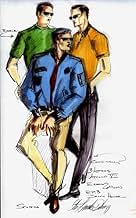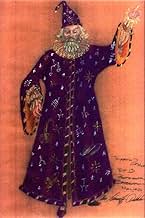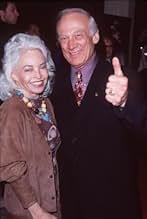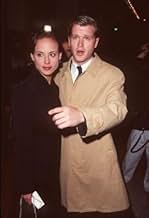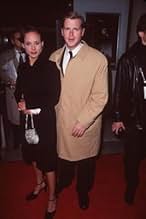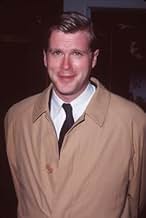Traçando a história das expedições históricas de Apolo à Lua durante os anos 60 e início dos anos 70.Traçando a história das expedições históricas de Apolo à Lua durante os anos 60 e início dos anos 70.Traçando a história das expedições históricas de Apolo à Lua durante os anos 60 e início dos anos 70.
- Ganhou 3 Primetime Emmys
- 22 vitórias e 33 indicações no total
Enredo
Você sabia?
- CuriosidadesThe lunar excursion module (LEM) seen in several episodes up close, is in fact a real lunar module. It was originally scheduled to go to the Moon as part of the Apollo 18 flight; NASA budget cuts forced Apollo 18's cancellation, but the LEM was saved and eventually used in filming this miniseries. It is now enshrined in a museum. In some episodes, we can see a bus-like craft which takes the astronauts from NASA down to the pad at Cape Kennedy just prior to launch. This bus is also the real thing, which the real astronauts all used.
- Erros de gravaçãoIn the first episode there is a scene that shows a Navy ship, the ship shown is a Ticonderoga class cruiser, the Navy commissioned the first one, the USS Ticonderoga (CG 47), on Jan. 22, 1983.
- Citações
Clinton Anderson: [at the senate inquiry following the Apollo 1 fire] Colonel, what caused the fire? I'm not talking about wires and oxygen. It seems that some people think that NASA pressured North American to meet unrealistic and arbitrary deadlines and that in turn North American allowed safety to be compromised.
Frank Borman: I won't deny there's been pressure to meet deadlines, but safety has never been intentionally compromised.
Clinton Anderson: Then what caused the fire?
Frank Borman: A failure of imagination. We've always known there was the possibility of fire in a spacecraft. But the fear was that it would happen in space, when you're 180 miles from terra firma and the nearest fire station. That was the worry. No one ever imagined it could happen on the ground. If anyone had thought of it, the test would've been classified as hazardous. But it wasn't. We just didn't think of it. Now who's fault is that? Well, it's North American's fault. It's NASA's fault. It's the fault of every person who ever worked on Apollo. It's my fault. I didn't think the test was hazardous. No one did. I wish to God we had.
- Versões alternativasFor the DVD release, the series was cropped slightly at the top and bottom of the frame. This was done to create a presentation that would be enhanced for viewing on widescreen television sets.
- ConexõesEdited into Race for Space (2010)
This mini-series details the history of the Apollo program from how manned spaceflight got started to the last man on the moon. It very accurately details how we achieved humankind's greatest feat ever: the voyage to, exploration of, and return from, the moon, while adding a very reasonable dramatic twist to it. There are moments where you might laugh, and there are moments where you might feel like crying. There will also be moments where you might feel something else.
Tom Hanks, Ron Howard, Brian Grazer, and the rest of the production staff did an absolutely amazing job in putting this together, everything from the visual effects to the cast and crew. The casting was done so great that this is the first time you cannot pin leading roles in any of the episodes let alone the whole series, even with big names (Hanks, Tony Goldwyn, Mark Harmon, Adam Baldwin, Tim Daly, Cary Elwes, Jay Mohr, Stephen Root, and Lane Smith, not to mention several other big names). Even the writer of the book it's based on, Andrew Chaikin, gets a cameo as the host for "Meet the Press." The soundtrack to this day continues to give me goosebumps highlighting the emotional nature of this series.
Each episode (except episode 12) starts with Hanks as the "host" telling a short anecdote which ties into the episode. The series starts off with featuring the start of the U.S. Manned Space Program versus the Soviet program, highlighting the "firsts" in space by the Soviets and then the Americans, from Mercury to Gemini to the development of Apollo. Episode 2 centers on Apollo 1 fire and the resulting investigation. Episode 3 involves the resumption of the program and highlights the crew before they lift off.
Other Highlightable episodes include the fourth episode, called "1968," which despite how devastating the events of that year were, the Apollo 8 mission helped the year close on a more positive note. The sixth episode highlights the famous Apollo 11 landing on the moon and the first man to step on the moon. Episode 8 is notable for Apollo 13 after its explosion and how the media was trying to find almost anything to feed a hungry audience with tabloid journalism instead of just the facts. Episode 11 is very notable since it focuses on how the wives of Apollo astronauts were affected by their husband's celebrity status and how they coped through the tense, exciting and devastating times. Episode 12, probably one of the most emotional episodes in the series, is about Apollo 17 (the last mission on the moon) and how this mission relates to the a dream from 70 years before by a man called George Melies when he created the moving picture "Le Voyage Dans La Lune." The performances of Hanks (his only appearance as an actor in the series), Daniel Hugh Kelley, Tom Amandes, Tchéky Karyo, Lane Smith, and Stephen Root, with the voice-over of Blythe Danner, make this episode very emotional, especially with everyone except for Karyo in interviews as their older selves.
As much factual information is used while keeping any fictionalized material to a minimum, such as the TV network featuring Emmitt Seaborn (Lane Smith)anchoring the missions for the nation.
This mini-series reminds me what we have worked for in our society and how we are letting that deteriorate now. Back then, it was a man landing on the moon that united the world. It makes you think whether we need something at that caliber to reunite our world today, and how we need to forget our petty differences and better our society as a whole. When you watch this, should think about that, because this is a series you will absolutely never forget.
- heichers
- 16 de mai. de 2001
- Link permanente
Principais escolhas
- How many seasons does From the Earth to the Moon have?Fornecido pela Alexa
Detalhes
- Data de lançamento
- País de origem
- Idioma
- Também conhecido como
- From the Earth to the Moon
- Locações de filme
- Empresas de produção
- Consulte mais créditos da empresa na IMDbPro
- Tempo de duração53 minutos
- Cor
- Mixagem de som
- Proporção
- 1.78 : 1
Contribua para esta página




